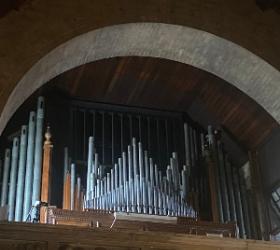
Two Kudos, One Loss
Polar Music Prize for Ligeti
Sweden's Polar Music Prize for 2004 has been awarded jointly to American bluesman B. B. King and Hungarian composer György Ligeti. The 80-year-old composer was cited for "stretching the boundaries of the musically conceivable from mind-expanding sounds to new astounding processes in a thoroughly personal style that embodies both inquisitiveness and imagination"--certainly descriptive of his most successful harpsichord composition Continuum [Mainz: B. Schott's Söhne, Edition 6111]. This four-minute piece delivered to Swiss harpsichordist Antoinette Vischer in 1968 provided a perfect realization of the composer's projection (in a 1965 letter to the commissioning harpsichordist) for a "somewhat-virtuosic, toccata-like piece that has nothing to do with the Neo-Baroque--not a motoric, but rather an elastically-oscillating movement."
In a slightly later communication to Vischer, Ligeti instructed her to "please play Continuum irrationally fast, even faster than possible, surely even faster than Schumann's [directive] 'even faster'." An instruction carried out, incredibly, by the usually less-than-virtuose Vischer in her Wergo recording [305], widely assumed to have been recorded an octave lower and re-recorded at double speed!
Ligeti's shimmering, incandescent toccata fascinates throughout its perfect duration. Difficult, but not impossible to master, this composition receives my vote as the most interesting and original harpsichord composition of the 20th century. Thank you, Maestro Ligeti, and congratulations on this latest recognition.
Malcolm Hamilton Dies at Age 70
On November 17, 2003 southern California harpsichordist Malcolm Hamilton died of congestive heart failure while enroute to a hospital in Mission Viejo. Born December 14, 1932 in Victoria, British Columbia, Hamilton was a recipient of America's National Defense Education Act Scholarship, affording him the opportunity for study at the University of Washington in Seattle. There he was the first student to obtain both undergraduate and graduate degrees in harpsichord. His doctorate in harpsichord was earned from the University of Southern California, where he studied with the colorful Landowska student Alice Ehlers.
Although he retired from his own teaching career at USC in 1997, Hamilton continued to perform. His last appearance as a solo harpsichordist was in Frank Martin's Petite Symphonie Concertante with the San Bernardino Symphony in October. Always an ebullient performer, Hamilton's concerts were anything but stuffy. Although he was interested in stylistic matters he was more concerned with keeping his audiences awake. Often eschewing formal dress, the harpsichordist was happier wearing less-constrictive clothing such as a flowing silk caftan, his garb of choice for this final performance.
Honoring Gustav Leonhardt's 75th Birthday
Twelve essays and a new transcription of J. S. Bach's Solo Violin Partita BWV 1004 comprise a hardbound book The Keyboard in Baroque Europe (Cambridge University Press, 2003; ISBN 0 521 81055 8), dedicated to "Gustav Leonhardt on the occasion of his seventy-fifth birthday, 30 May 2003."
In a felicitous preface, editor Christopher Hogwood writes of Leonhardt's pre-eminent stature in the world of the revived harpsichord, his position as one of the earliest scholar-performers, and his salutary example in the broadening of the "standard" baroque repertoire for keyboards. The contributed essays, each in some way related to a musical interest of the dedicatee, are presented in four categories.
Part I: Seventeenth-Century Keyboard Music contains Alexander Silbiger's "On Frescobaldi's recreation of the chaconne and the passacaglia;" Rudolf Rasch's "Johann Jacob Froberger's travels 1649–1653;" Pieter Dirksen's "New perspectives on Lynar A1 [particularly works by English Virginal composers, eight French courantes, and twelve further pieces by Pieter Cornet, Peter Philips, Scheidt, and others];" and "Creating the corpus: the 'complete keyboard music' of Henry Purcell" by editor Hogwood.
The Early Eighteenth Century (Part II) comprises John Butt's "Towards a genealogy of the keyboard concerto" and Davitt Moroney's "Couperin, Marpurg and Roeser: a Germanic Art de Toucher le Claveçin, or a French Wahre Art?" Part III presents four essays concerned with the Bach Family: "Invention, composition and the improvement of nature: apropos Bach the teacher and practical philosopher" (Christoph Wolff); "Is there an anxiety of influence discernible in J. S. Bach's Clavierübung I?" (Peter Williams); "'Towards the most elegant taste': developments in keyboard accompaniment from J. S. to C. P. E. Bach" (David Schulenberg); and "' . . . welche dem grössten Concerte gleichen': the polonaises of Wilhelm Friedemann Bach" (Peter Wollny).
The Later Eighteenth Century (Part IV) consists of two offerings: "Schnellen: a quintessential articulation technique in eighteenth-century keyboard playing" by Menno van Delft and "Mozart's non-metrical keyboard preludes" by Robert D. Levin, a topic that serves to connect the reader with Leonhardt's more recent interest in the fortepiano and its repertoire. As a Musical Envoi Lars Ulrik Mortensen's new arrangement of J. S. Bach's Violin Partita in D minor is presented as a Keyboard Partita in A minor after BWV 1004. Mortensen's transcription is consistently idiomatic, and there is an added gravity gained from the lower A minor tessitura, particularly effective in the best-known movement, the monumental concluding Chaconne.
This scholarly, thoughtful, and sometimes-surprising volume is an appropriate tribute to Leonhardt, described by Hogwood as the "head gardener" of the harpsichordists' "musical garden," and surely for many of us the most influential proponent of early keyboard music in the second half of the twentieth century. A 1979 photograph of the dedicatee at the harpsichord and a comprehensive Index complete this highly-recommended 245-page celebratory volume.
Send news items or comments about Harpsichord News to Dr. Larry Palmer, Division of Music, Southern Methodist University, Dallas, TX 75275;




